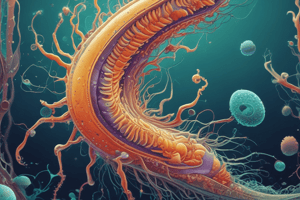Podcast
Questions and Answers
What type of cellular structure do they have?
What type of cellular structure do they have?
- Unicellular with prokaryotic cells
- Multicellular with eukaryotic cells
- Multicellular with prokaryotic cells
- Unicellular with eukaryotic cells (correct)
What mostly performs metabolic functions in these cells?
What mostly performs metabolic functions in these cells?
- The cell membrane
- The cell wall
- Specialized internal structures (correct)
- External structures like flagella
What is found in the vesicular nucleus?
What is found in the vesicular nucleus?
- RNA only
- Central body called endosome or nucleoli (correct)
- Only nucleoli without endosome
- Chromatin exclusively
Which of the following lack DNA in their endosome?
Which of the following lack DNA in their endosome?
What type of nuclei do ciliates have?
What type of nuclei do ciliates have?
What does the plasma membrane enclose?
What does the plasma membrane enclose?
What causes the nucleus to have a diffused appearance?
What causes the nucleus to have a diffused appearance?
Flashcards are hidden until you start studying
Study Notes
What is Protozoa?
- Protozoa are unicellular, eukaryotic, and heterotrophic organisms.
- They can be either free-living or parasites.
- There are approximately 65,000 species of protozoa, categorized into different groups.
Characteristics of Protozoa
- Lack a cell wall.
- Have various cell organelles that perform different tasks, similar to organs in higher animals.
Cellular Structure
- Protozoa are unicellular organisms with a eukaryotic cell.
- Metabolic functions are performed by specialized internal structures.
- Typically have one membrane-bound nucleus in the cell.
- The nucleus has a diffused appearance due to scattered chromatin.
- The vesicular nucleus contains a central body called endosome or nucleoli.
- Nucleoli of apicomplexans have DNA, whereas amoeboid nucleoli lack DNA.
- Ciliates have micronucleus and macronucleus.
- The plasma membrane encloses the cytoplasm and locomotory projections like flagella, pseudopodia, and cilia.
Protozoa and Diseases
- Some protozoa cause diseases in animals and humans, such as:
- Plasmodium (malaria)
- Trypanosoma (sleeping sickness)
- Trichomonas (trichomoniasis)
Studying That Suits You
Use AI to generate personalized quizzes and flashcards to suit your learning preferences.




